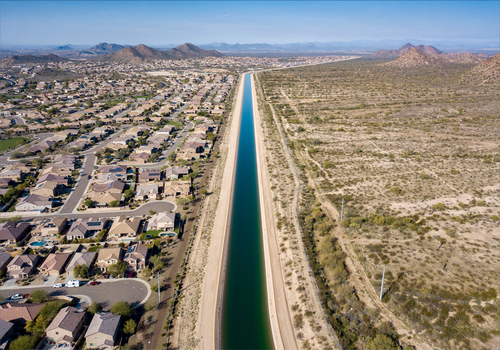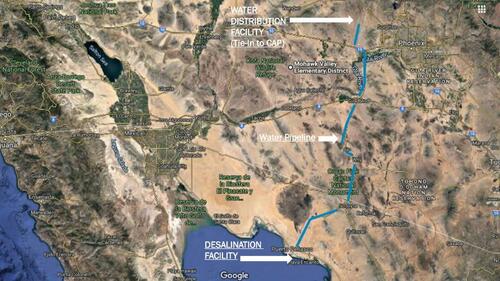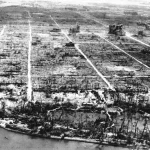
With a surge in population growth, soaring urban development, and, of course, desert conditions, it comes as no surprise the Phoenix metropolitan area could one day run out of groundwater. On Thursday, local authorities declared the state would no longer issue building permits for new developments across the metro area unless alternative water sources can be found.
Arizona Gov. Katie Hobbs said a newly released study of the Phoenix metropolitan area's groundwater showed a potential shortage looms. To safeguard supplies, current developments that have been approved can be constructed, but ones that have yet to be approved will have to show alternate water sources. Developers must show state officials they have an alternative "assured water supply" for 100 years from non-local groundwater.
The study found that 4% of the metro area's demand for groundwater, nearly 4.9 million acre-feet, cannot be met over the next century. If the projections are correct, a massive water shortage could be nearing and have widespread implications for the post-Covid development boom.
Thursday's announcement is a sign the water-scarce metro area, situated in a desert, has limitations in terms of the number of homes it can support.
"It's going to make it harder for developments to spring up on raw desert in the far-flung parts of town where developers like to develop," Sarah Porter, the director of the Kyl Center for Water Policy, told CNN.
The former Phoenix mayor, Terry Goddard, said the study indicates residents are "living on borrowed water." He added:
"You need to be conscious of every drop. You can't build unless you know exactly where the water is coming from."
Last year, Arizona's Water Infrastructure Finance Authority began reviewing a proposal for a multibillion-dollar project to construct a water desalination plant in Mexico that would pump water through a 200-mile pipeline to the border state to counter its drought-driven water uncertainty.
Instead of blaming climate change, Phoenix should remember they're situated in the middle of the desert, and the explosive population growth in the last several years draws down on finite resources much quicker. If the metro area wants to continue to expand, it might have to consider the 200-mile pipeline from Mexico.
With a surge in population growth, soaring urban development, and, of course, desert conditions, it comes as no surprise the Phoenix metropolitan area could one day run out of groundwater. On Thursday, local authorities declared the state would no longer issue building permits for new developments across the metro area unless alternative water sources can be found.
Arizona Gov. Katie Hobbs said a newly released study of the Phoenix metropolitan area’s groundwater showed a potential shortage looms. To safeguard supplies, current developments that have been approved can be constructed, but ones that have yet to be approved will have to show alternate water sources. Developers must show state officials they have an alternative “assured water supply” for 100 years from non-local groundwater.
The study found that 4% of the metro area’s demand for groundwater, nearly 4.9 million acre-feet, cannot be met over the next century. If the projections are correct, a massive water shortage could be nearing and have widespread implications for the post-Covid development boom.
Thursday’s announcement is a sign the water-scarce metro area, situated in a desert, has limitations in terms of the number of homes it can support.
“It’s going to make it harder for developments to spring up on raw desert in the far-flung parts of town where developers like to develop,” Sarah Porter, the director of the Kyl Center for Water Policy, told CNN.
The former Phoenix mayor, Terry Goddard, said the study indicates residents are “living on borrowed water.” He added:
“You need to be conscious of every drop. You can’t build unless you know exactly where the water is coming from.”
Last year, Arizona’s Water Infrastructure Finance Authority began reviewing a proposal for a multibillion-dollar project to construct a water desalination plant in Mexico that would pump water through a 200-mile pipeline to the border state to counter its drought-driven water uncertainty.
Instead of blaming climate change, Phoenix should remember they’re situated in the middle of the desert, and the explosive population growth in the last several years draws down on finite resources much quicker. If the metro area wants to continue to expand, it might have to consider the 200-mile pipeline from Mexico.
Loading…






